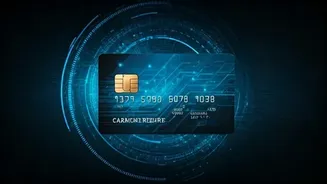Never Disclose Sensitive Data
The cornerstone of credit card security is the protection of your personal information. Refrain from divulging your card number, the Card Verification
Value (CVV) code, or your Personal Identification Number (PIN) to anyone, regardless of their purported affiliation. Scammers frequently employ deceptive tactics, such as posing as bank representatives or offering enticing deals, to extract sensitive financial data. Remember, legitimate financial institutions will never ask for your PIN or full card details via phone, email, or text. If you encounter such a request, it is most likely a phishing attempt. Always verify any communication from financial institutions by contacting them directly through their official channels.
Practice Safe Online Shopping
Online shopping has become a pervasive activity, but it also presents opportunities for fraud. Exercise extreme caution when making online purchases. Prior to entering any financial information, meticulously review the website's security features. Ensure the site uses a secure connection, indicated by 'https' in the URL and a padlock symbol in the address bar. Furthermore, scrutinize the website's legitimacy by checking for contact information, a clear privacy policy, and customer reviews. Beware of deals that appear too good to be true, as these can be lures designed to steal your information. Avoid using public Wi-Fi networks for financial transactions, as these networks can be easily compromised. Instead, use a secure, private network to conduct any financial activity online.
Protect Your Card Details
Securing your credit card details requires proactive measures in both the digital and physical realms. When transacting online, save your payment information only on trusted websites and, even then, consider using virtual credit card numbers if available. Be cautious when using public computers or shared devices, as these may contain malware that can capture your data. When physically using your card, always shield your PIN from view when making a transaction at ATMs or point-of-sale terminals. Regularly check your credit card statements for any unauthorized transactions and report them immediately to your bank. If you lose your card or suspect that it has been compromised, contact your bank immediately to have your card blocked.
Set Up Transaction Alerts
One of the most effective strategies for monitoring your credit card activity is to enable transaction alerts. Many financial institutions offer this service, which allows you to receive notifications via SMS or email every time your card is used. These alerts can be customized to notify you of any transaction, or only those exceeding a certain amount. This proactive approach helps you to quickly identify and address any fraudulent activity as it happens. Consider setting up alerts for all transactions, even small ones, to detect any unauthorized use promptly. The speed with which you can report fraudulent transactions significantly impacts the possibility of reclaiming your money and minimizing damage. Regularly check your alert settings to ensure they are configured to your preferences and are being delivered to your active contact details.
Keep Your Card Secure
Physical security of your credit card is essential for protecting against theft and misuse. Never leave your card unattended, and keep it in a secure location at all times. When carrying your card, avoid keeping it in places easily accessible to others, such as back pockets or loosely fastened bags. When traveling, store your card in a secure wallet or money belt. Be cautious of those around you when using your card at restaurants or shops. Make sure you get your card back immediately after the transaction is complete. If you suspect your card has been stolen, report it to the issuing bank as soon as possible. Also, consider the use of card protectors to prevent physical damage or RFID skimming.












